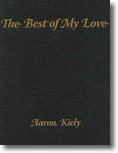
THIS CONNECTION OF EVERYONE WITH LUNGS: POEMS
by Juliana Spahr, Univ. of California (2005)
This fast-moving collection is one of the more effective poetic responses to 9/11 that I’ve read so far. It’s composed of two extended pieces in prose, the second far longer, though perhaps ultimately less moving, than the first.
That first piece, matter-of-factly titled “Poem Written After September 11, 2001,” overtly references that day only in the title. The poem itself is an attempt at consolation and the assumption of responsibility by the individual for the events that take place in the larger world, seemingly outside of the sphere of individual influence. By an impressive act of linguistic accretion, Spahr manages to illustrate how each individual in factually, if not scientifically, connected to every other, and is therefore responsible for everyone else. She begins like this (I will use this symbol “#” below to separate quoted text from my own writing):
#
There are these things:
cells, the movement of cells and the division of cells
and then the general beating of circulation
and hands, and body, and feet
and skin that surrounds hands, body, feet.
This is a shape,
a shape of blood beating and cells dividing.
#
Soon she shows us this:
#
There is space around the hands and space in the room
…
Everyone with lungs breaths the space in and out as everyone
with lungs breathes the space between the hands in and out
#
Toward the end of the poem, several pages later, she has built up to this:
#
as everyone with lungs breathes the space between the hands
and the space around the hands and the space of the room and
the space of the building that surrounds the room and the space
of the neighborhoods nearby and the space of the cities and the
space of the regions and the space of the nations and the space
of the continents and islands and the space of the oceans and the
space of the troposphere in and out
#
While the experience of reading this work can get a bit tedious (she adds another element to the growing list with each new stanza/paragraph), which is my only real issue with this poem, Spahr manages to take us through, or lead us into, a prolonged act of empathy. By the end, it seems impossible to think of oneself as anything but a part of a minutely interconnected system, which, hurt at any one point, is hurt throughout. Hence, by titling the poem as she does, she shows us all to be responsable for the events and aftereffects of the Trade Tower bombings. It’s at once a grand gesture of consolation and a powerful call to do something to repair the damage.
That gestures segueways into the second part of the book, which takes up most of its pages. It’s called “Poem Written from November 30, 2002, to March 27, 2003.” It’s made up of many several-page sections titled with their dates of composition. In it, Spahr narrates her own observation of the TV news as the bombing of Afghanistan and the War in Iraq gets underway. The poem is set in Hawaii, where Spahr is living along with a lover. She addresses the lover and us throughout as “Beloveds,” and, once again, links us to the unfolding events of the war:
#
When I speak of your thighs and their long muscles of smooth-
ness, I speak of yours cells and I speak of the British Embassy
being closed in Kenya and the US urging more aggressive Iraq
inspections and the bushfire that is destroying homes in Sydney.
#
I like this piece less than I like the first, in part because reading it is more tedious, and because the language is sometimes so journalistic it approaches regular prose, and because I have a bit more trouble buying Spahr’s syntheses of self and other in the poem. But, unifying the whole piece is a consoling, guilty tone—the same as in the first piece—that I find very remarkable.
Overall, I think this book is an important piece of 9/11 literature that in fact expresses the complex ambivalence many Americans have felt since 2001. I hadn’t heard much about the book and came to own a copy of it in a rather random way. I think it ought to be read by any sensitive person looking for a way to articulate their own feelings about the last few years in American life.



